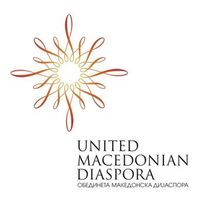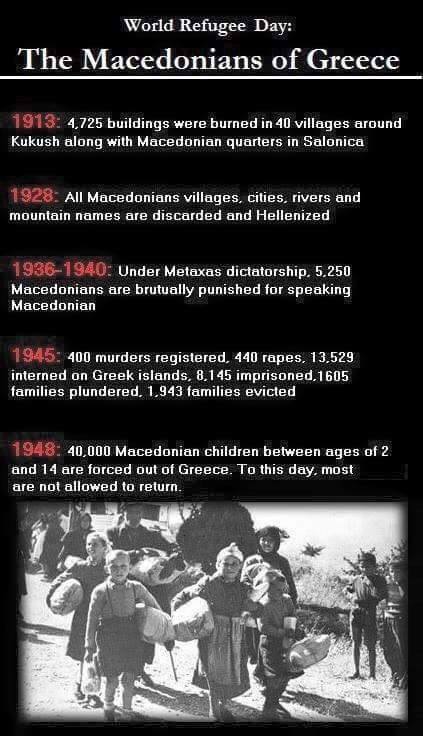 Photo credit: UMD
Photo credit: UMD It is shocking to see an organization such as the UMD stoop so low on a day that commemorates the plight of refugees to be used to attack the state of Greece and its people.
On World Refugee Day, June 20, 2017, the UMD promoted the below image which was created by its youth wing - "Generation M" - in which baseless, historically inaccurate information and events were presented "as facts" to a wide audience.
Since its inception, the agenda of the UMD has been to portray Greece (and Greeks) in a negative light due to the organization's ultra-nationalist ties with the former VMRO-DPMNE government of the 'Former Yugoslav Republic of Macedonia (FYROM).'
However, it must be stressed, regardless of the differences that the UMD has with Greece, the decision made by their Executive Committee to purposely spread anti-Hellenic sentiments and historical misinformation on a day like World Refugee Day is quite appalling. It shows a total disregard and lack of respect for people who have gone through great lengths to leave a war-torn country in search of a better life elsewhere.
Below, the Macedonian League responds to the inaccuracies promoted by the UMD:
 Photo credit: Generation M - Youth Wing of the
Photo credit: Generation M - Youth Wing of theUnited Macedonian [sic] Diaspora (UMD)
"4,725 buildings were burned in 40 villages around Kukush^ [sic] along with Macedonian [sic] quarters in Salonica"
TRUE HISTORICAL ACCOUNT #1:
The 40 villages around Kilkis were Greek villages and the Greek Army had no reason to burn them*. The event that did take place in the year in question was the Battle of Kilkis
(also referred to as the Battle of Kilkis-Lachanas [1]) which occurred during the second Balkan War from the 19th to the 21st of June 1913 and was a battle between Bulgarians and the Greeks. History shows that the second Balkan war [2] took place between Bulgaria on one side and Romania, Serbia, Montenegro, Greece and Ottoman Turkey on the other, resulting in the Treaty of Bucharest [3] in 1913, setting the borders of BULGARIA in relation to its neighbors. The political creation of Slavic 'Macedonians' had not occurred yet, hence there are no historical references to such an ethnic group.
^ Kukush is the Bulgarian name for the city of Kilkis, in the province of Macedonia, Greece
* Similar historically inaccurate attempts at providing misinformation about the tragic 1917 Fire of Thessaloniki [4] have also been made by the UMD and other FYROM Slav diaspora groups; this fire too had NOTHING to do with ethnic hatred and was a fire started accidentally in the kitchen of a small house when a spark fell in a pile of straw and ignited it. In all, 32% of the city of Thessaloniki was destroyed. 4,000 shops burned and over 70,000 people were displaced. Due to lack of water, the initial fire was not put out. Eventually, an intense wind carried the fire to the neighboring houses, and it continued throughout central Thessaloniki.
>> MYTH #2 - 1928:
"All Macedonians [sic] villages, cities, rivers and mountain names are discarded and Hellenized"
TRUE HISTORICAL ACCOUNT #2:
Place names did not require Hellenization as they already consisted of Hellenic, Bulgarian and Turkish names. The restoration of the toponyms to their original form started immediately after Greece officially took over the liberated areas**. Furthermore in 1928, after the Treaty of Lausanne, Greece and Bulgaria signed the Kalfov-Politis agreement which enabled the VOLUNTARY exchange of the local Greek and Bulgarian population between Greece and Bulgaria. Once again, there is no historical evidence of Slavic 'Macedonian' groups in existence.
**When the Ottomans took over the region, names of villages, cities, rivers and mountains were Greek due to the previous reign of the Byzantine Empire - these names pre-existed the Ottoman occupation. Upon the occupation of Macedonia by the Ottomans, the new administration gave names that fitted their phonetic system, hence Thessaloniki became Selanik, etc. Cities, villages and towns that were built during the Ottoman administration kept the names the Ottomans had given them, e.g. Yanitsa, Kilkis. Thus the only thing the Greeks did was to adjust the names to their phonetics. Our question is, why have the authorities of Skopje changed the names of Skopje, from the original Dardanian name Skup to the present Skopje? What about Bitola from Monastirion, or Stypeon to Shtip or Kavadarci from Tikvesh? Greece had no obligation to keep toponyms that the Ottomans gave them. The Turks also changed Greek toponyms themselves in Turkey, e.g. Constantinople to Istanbul, Rize, Izmir, etc.
Evidently, the so-called 'Macedonians' want Greece to keep toponyms that Bulgarians and Serbians had given them. True Macedonians, being Ethnically Greeks, had no problem keeping the names their ancestors had given them. After all, a name such as Thessaloniki is very Greek. One finds the toponym Solun in Slavic Literature, e.g. Slavic version of the Bible whether it is in Czech, Slovak, Croatian, Serbian, or Bulgarian. Slovenians kept the name Tesaloniki (Pavlovo delo v Tesaloníki (2,1-16) ). Note however, in the original language of the New Testament, the city’s name is Thessaloniki, and this original Greek name is what counts!
>> MYTH #3 - 1936-1940:
"Under Metaxas dictatorship, 5,250 Macedonians [sic] are brutally punished for speaking Macedonian [sic]"
TRUE HISTORICAL ACCOUNT #3:
Metaxas was brutal to ANYONE WHO WAS A COMMUNIST whether they were Greeks, Bulgarians or Albanians. He was totally against the Comintern's 1934 proposal to create an artificial “Macedonian” nation-state, due to the territorial implications on Greece's regional province of the same name.
>> MYTH #4 -1945:
"400 murders registered, 440 rapes, 13,529 interned on Greek islands, 8,145 imprisoned, 1,605 families plundered, 1,943 families evicted"
TRUE HISTORICAL ACCOUNT #4:
In the period between 1945 and 1949, ANYONE who had committed crimes against the Greek state in association with the German and the Bulgarian occupying forces during WWII, or had taken arms against the legal government of Greece was sent to the island of Makronissos between Athens and Evia or tried and executed for treason. This included any citizens of Greece (Slav or Greek) who attempted the illegal annexation of Greek land to Yugoslavia with the help of Bulgarian and German occupying forces. As for the rest, the Slavs should be talking to the members of the “Democratic Army”, i.e. the allied to the Slavs communist forces, which incidentally, were responsible for the kidnapping of about 30,000 Greek children, an act that the UN officially condemned Yugoslavia***.
***For this reason and in an effort to protect other Greek children from being kidnapped by the communists, the Greek government under the auspices of the then Queen Frederica, organized the camps for children of all ages known as Paidopoleis. It was a network of 53 Camps all over Greece where mostly orphans and children of poor families were housed and educated. The camps were the only means of survival through shelter, food, and education.
>> MYTH #5 - 1948:
"40,000 Macedonian [sic] children between the ages of 2 and 14 are forced out of Greece. To this day most are not allowed to return"
TRUE HISTORICAL ACCOUNT #5:
Following the Greek civil war, children were taken out of Greece by retreating Communists. The United Nations General Assembly (UNGA) Resolution 193 (1948) and the (UNGA) Resolution 288 (1949), unanimously condemned the kidnapping of 29,877 Greek children by the communist forces demanding their return. These and subsequent UN resolutions were ignored by Albania and Yugoslavia. From 1950 to 1952, only 684 children were permitted by communist countries to return to Greece because of the pressure of the Red Cross and two new UN Resolutions. The children were pushed to Bulgaria (17 camps), Romania (11 camps), Hungary (11 camps), Czechoslovakia (18 camps), Poland (3 camps), East Germany and Albania (5 camps), and 9,500 went to Yugoslavia (15 camps). As adults, many of these children returned to Greece, but it was their choice.
To be absolutely clear, it is NOT the kidnapped children that cannot return home. It is the ADULTS who committed crimes against humanity that will be facing justice if they ever return to Greece.
About the Macedonian League
We are an international professional Hellenic advocacy group. Our primary purpose is to advance our interests to informed and responsive governments on issues concerning Greece's national security and territorial integrity.
The Macedonian League's main focus is on the “Macedonian name dispute”, as this dispute is a serious national security issue that threatens the territorial integrity of Greece.
The Macedonian League also focuses on exposing and combating anti-Hellenism and analyzing political developments in the Former Yugoslav Republic of Macedonia.
For more information, follow us on: Website, Facebook, Twitter
Department of Communications
Macedonian League




 RSS Feed
RSS Feed